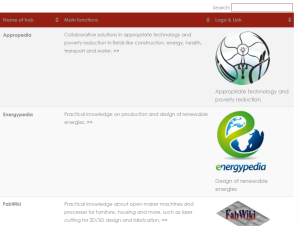 In previous blog entries, I talked a lot about commons-based peer production and learning in areas crucial to development cooperation such as Energy, Health, Education etc. A key question then is where to find such “free knowledge” for open innovation and for peer-production in the different sectors of human development?
In previous blog entries, I talked a lot about commons-based peer production and learning in areas crucial to development cooperation such as Energy, Health, Education etc. A key question then is where to find such “free knowledge” for open innovation and for peer-production in the different sectors of human development?
I have collected an annotated compendium of hubs for commons-based peer production that are of particular interest for sustainable human development. These hubs include energypedia, appropedia, opensourceecology, Howtopedia, knowable, and Fabwiki. The compendium is complemented by links to comprehensive directories.
Please note, that I have included mainly hubs with a focus on “production”, on “peer-driven production” and on “commons-based initiatives” for human development. All those chosen focus on open learning and practical improvement on a community-level; nevertheless, many of them have a global reach.
Many of the platforms have deliberately chosen open models and ‘open source’ licenses that enable “commons-based peer production” as envisioned by Yochai Benkler. Why? Because they feel, that ‘open source’ licensing can best spur open learning, invention, and innovation processes that come with it.
So here is my compendium of hubs for commons-based peer production for sustainable human development.
>>> Do you know more such hubs? Please let me know.
>>> Any other questions or answers on the issue above? Please comment below!
_______________________
About ‘learning by sharing’
This blog is part of a series of 10 questions that I have extracted of my article “Learning by Sharing – „How global communities cultivate skills and capacity through peer-production of knowledge“. The piece has been released in June as part of the GIZ Online- Series „10 trends in open innovation. How to leverage social media for new forms of cooperation“. It discusses the following issues: Sustainable human development needs solutions that scale, empower, benefit, and increase ownership. Peer-to-peer learning is a potential game changer: the trick is to build learning processes around open, commons-based peer production. Only then may one achieve more freedom to know, more appropriation of tacit knowledge, more self-sustainability of demand-driven learning systems, and more ownership. In addition, the inherent fairness of an open “knowledge commons” provides opportunities for unfettered open innovation and the scaling up of development solutions. Commons-based peer learning offers a trigger to enhance skills, competencies, connections, capacities, and the agency of people and their organisations on a global scale – from the global peer-to-peer university to the community of biogas digesters producers. It provides the freedom to learn – by sharing the world’s wealth of knowledge.
–> Article on the Alumniportal / Group on “Digital Society”:
http://10innovations.alumniportal.com/learning-by-sharing.html
–> Article personal blog – Here, you can comment, “like it” or RSS it there as well
https://www.knowledge-commons.de/en/learning-by-sharing/
Previous Questions:
– Peer production of knowledge: a game-changer for development cooperation? – Question 5 of 10 on ‚learning by sharing’
– What makes learning communities self-governed & fun? – Question 4 of 10 on ‚learning by sharing’
– How to build learning communities, that work peer-to-peer? – Question 3 of 10 on ‚learning by sharing’
– What makes people share knowledge? – Question 2 of 10 on ‚learning by sharing’
– What is commons-based peer learning? – Question 1 of 10 on ‚learning by sharing’
Further readings? Here.
____
Note: This text was first published on the blog of Balthas Seibold at the Alumniportal Germany (www.alumniportal-deutschland.org/en/). Check the blog ( register or login first). All blog entries represent the personal views and ideas of Balthas Seibold.